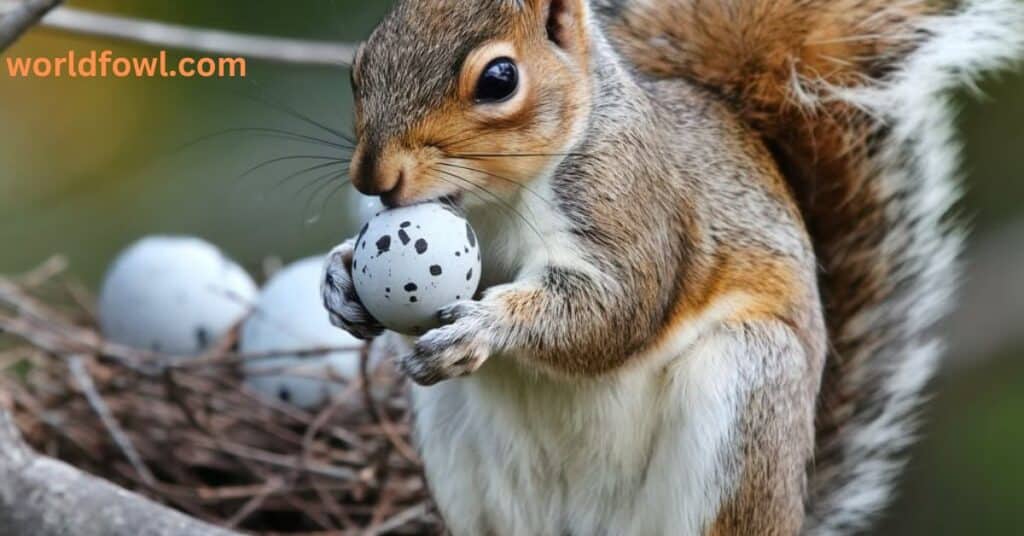Squirrels are a common sight in backyards, parks, and forests, often seen darting between trees and playfully foraging for food. But beyond their playful antics, squirrels can exhibit a surprising behavior that many people aren’t aware of—eating bird eggs. You may have wondered, “Do Squirrels Eat Bird Eggs ?” or noticed an empty nest after a squirrel visit.
While it may seem like an odd behavior, it’s actually quite common, especially among certain species of squirrels. In this in-depth article, we will explore the complex relationship between squirrels and bird eggs, how squirrels access these eggs, which species are most likely to engage in egg predation, and, most importantly, how you can protect bird eggs from these clever rodents.
Why Are Squirrels Interested in Bird Eggs?
Squirrels are known for being opportunistic feeders. They rely heavily on nuts, seeds, fruits, and fungi for their diet. However, squirrels known to eat a wide range of foods, and bird eggs are just one example of how they adapt their diet to available resources. Let’s explore why squirrels might target bird eggs in the first place.
Squirrels as Omnivores: A Flexible Diet
Squirrels are classified as omnivores, meaning they consume both plant-based and animal-based foods. Their diet primarily consists of foods they can easily forage, such as acorns, walnuts, sunflower seeds, and a variety of fruits and vegetables. However, squirrels observe eating fungi, insects, and even bird eggs when the opportunity presents itself.
This opportunistic behavior means squirrels aren’t picky eaters. They are always looking for easily accessible food that provides the nutrients they need to survive. Eggs, particularly bird eggs, offer a quick source of high-quality nutrition. The protein and fat content in eggs make them an ideal source of energy, especially for squirrels during times when other food options are sparse.
Food Scarcity and Opportunistic Feeding
Squirrels don’t usually seek out bird eggs as their first choice for food. However, during periods of food scarcity, such as in early spring when nuts from the previous year have been depleted, squirrels may turn to alternative food sources. In these times, when their usual food options limited, squirrels will often explore other potential food sources.
This behavior is especially common in urban and suburban environments, where squirrels exposed to a wide variety of potential food sources. If squirrels can’t find enough natural food like seeds or nuts, they may raid bird nests in search of eggs or chicks. Squirrels are highly adaptable, and their ability to seek out alternative food sources is one of the reasons they thrive in many different environments.
Nutritional Value of Bird Eggs
When it comes to bird eggs, squirrels drawn to the rich nutritional content they provide. Eggs are an excellent source of protein, fat, and calories, all of which are essential for a squirrel’s energy and growth. For example, a typical bird egg can provide anywhere from 50 to 100 calories, depending on the species. This makes eggs an appealing target when squirrels need to replenish their energy reserves, particularly after cold winters or during food shortages.
Because of the nutritional density of eggs, squirrels have developed the ability to target bird nests with precision. They can quickly consume the contents of a nest, gaining the necessary nutrients in a relatively short amount of time.
See Also : Do Kodiak Bears Attack Humans?
Behavior Among Different Squirrel Species
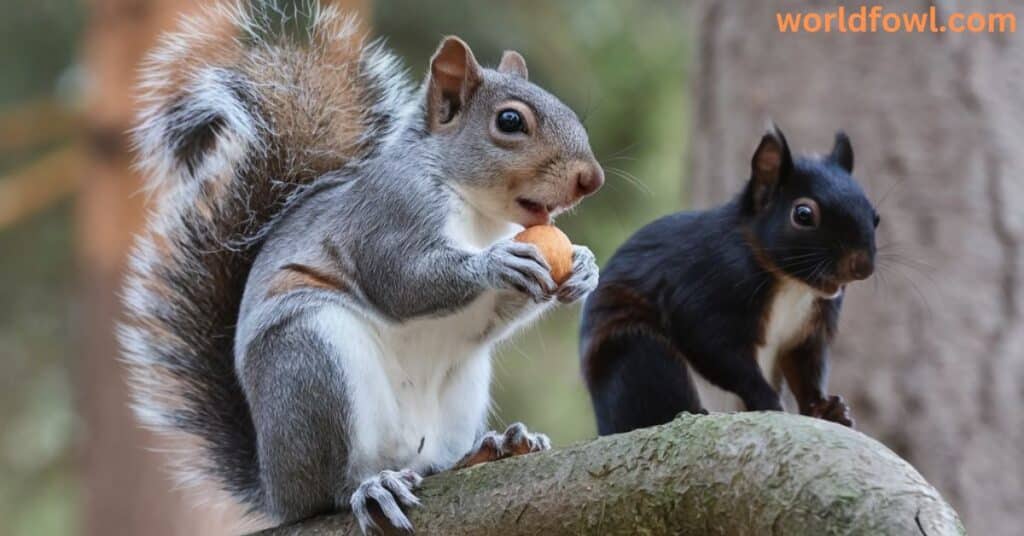
Not all squirrel species exhibit the same behavior when it comes to eating bird eggs. The likelihood that a squirrel will raid a bird nest for eggs can depend on the species, as well as the availability of other food sources. Let’s take a closer look at how different squirrel species behave and whether they are more likely to target bird eggs.
Eastern Gray Squirrel
The Eastern Gray Squirrel is one of the most commonly observe squirrel species in urban, suburban, and forested areas. These squirrels are particularly well-known for their opportunistic behavior, which makes them quick to adapt to changing food sources. The Eastern Gray Squirrel has an affinity for tree-dwelling nests, which makes it a frequent raider of bird nests that situated in trees or birdhouses.
The Eastern Gray Squirrel is highly agile and can easily climb trees, utility poles, and even walls in search of food. Its ability to scale vertical surfaces makes it one of the most effective squirrel species at accessing bird nests and raiding them for eggs. Additionally, these squirrels known to take advantage of birdhouses, making them particularly problematic for backyard bird enthusiasts.
Fox Squirrels
Fox squirrels another common species found in both urban and rural settings. While they are larger than the Eastern Gray Squirrel, they share many of the same traits when it comes to food foraging. Like the gray squirrels, fox squirrels are highly adaptable and will raid bird nests when other food sources are unavailable.
Fox squirrels are often found in wooded areas, where they search for acorns, nuts, and seeds. However, they are also known to exhibit the same opportunistic behavior as gray squirrels, making them a potential threat to bird eggs during times of food scarcity. These squirrels are particularly adept at raiding birdhouses and tree nests due to their size and agility.
Red Squirrels
Red squirrels are smaller and more territorial than their gray and fox counterparts. While they often found in forest environments, they also known to invade urban and suburban spaces in search of food. Red squirrels are more likely to target ground-nesting birds or low-lying bird nests that are easily accessible.
Unlike gray squirrels, red squirrels are not as adept at climbing smooth vertical surfaces. However, they are still capable of raiding nests when the opportunity arises. Red squirrels are more likely to engage in egg predation when food is especially scarce, such as during early spring when tree nuts have yet to mature.
Tree Squirrels vs. Ground Squirrels
The behavior of tree squirrels differs from that of ground squirrels when it comes to bird egg predation. Tree squirrels, such as Eastern Gray Squirrels, are primarily arboreal and use their climbing skills to access bird nests situated in trees or birdhouses. These squirrels well-suited to raiding tree nests and pole-mounted birdhouses due to their excellent climbing abilities.
In contrast, ground squirrels are more likely to target ground nests or those in low shrubs and grasses. They lack the ability to climb tall trees and are less likely to access nests located high up. However, they can still pose a threat to certain bird species that nest on the ground.
See Also : Do Jack Rabbits Attack Humans?
How Do Squirrels Access Bird Eggs?
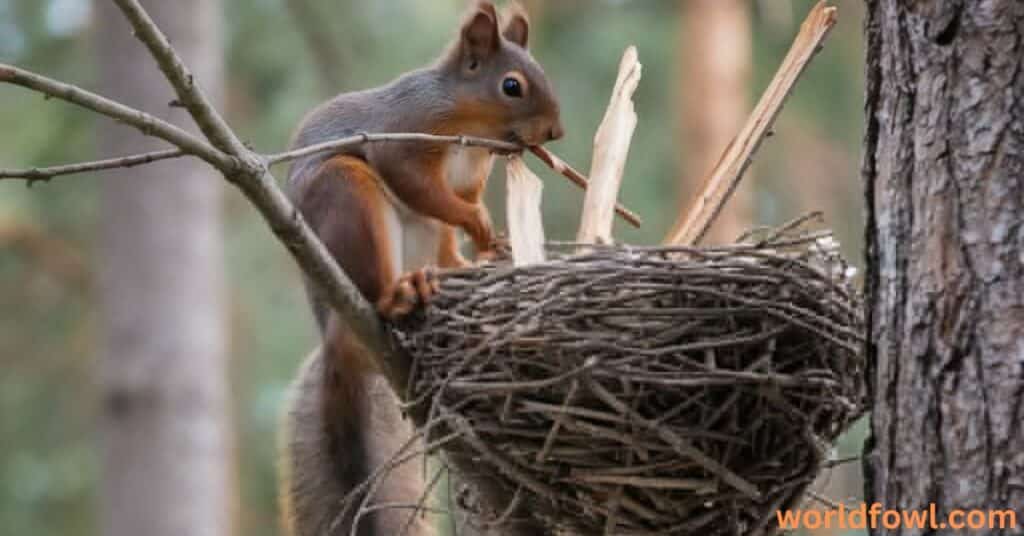
Squirrels are highly skilled at accessing bird nests, thanks to their impressive physical abilities. Their keen senses, sharp claws, and strong muscles allow them to scale trees, fences, and buildings with ease. Here’s how squirrels manage to access bird eggs in nests.
Climbing Abilities
One of the key features that make squirrels successful at raiding bird nests is their climbing ability. Squirrels are excellent climbers and can scale virtually any vertical surface. This gives them access to birdhouses on poles, tree nests, and even elevated areas like rooftops or balconies.
Squirrels use their sharp claws to grip onto tree bark, fences, and poles, allowing them to climb effortlessly. This makes them particularly dangerous to tree-dwelling birds and nesting sites that placed off the ground.
Nesting Locations
Birds often build nests in areas that are higher up, such as trees, birdhouses, or building ledges, to protect their eggs from ground predators. However, these elevated nesting sites are not safe from squirrels. Squirrels will target birdhouses that not properly protected or those that are located on low poles that squirrels can easily climb.
Squirrels can also access nests built in tree branches or roof gutters, making them a persistent threat to birds that nest in these locations. In some cases, squirrels will even raid nests that positioned on fences, as they are skilled at leaping and grabbing onto surfaces.
Seasonal Behavior
The behavior of squirrels when it comes to bird egg predation is often influenced by the time of year. During spring and early summer, squirrels are actively foraging for food to replenish their energy reserves after winter. This is also when bird eggs are most abundant, making it an ideal time for squirrels to raid nests. As spring nesting season ramps up, squirrels eating bird eggs becomes more common, as they are looking for a quick and easy food source.
See Also : Do Jaguarundi Attack Humans? Myths vs. Reality!
Do Squirrels Regularly Eat Bird Eggs?
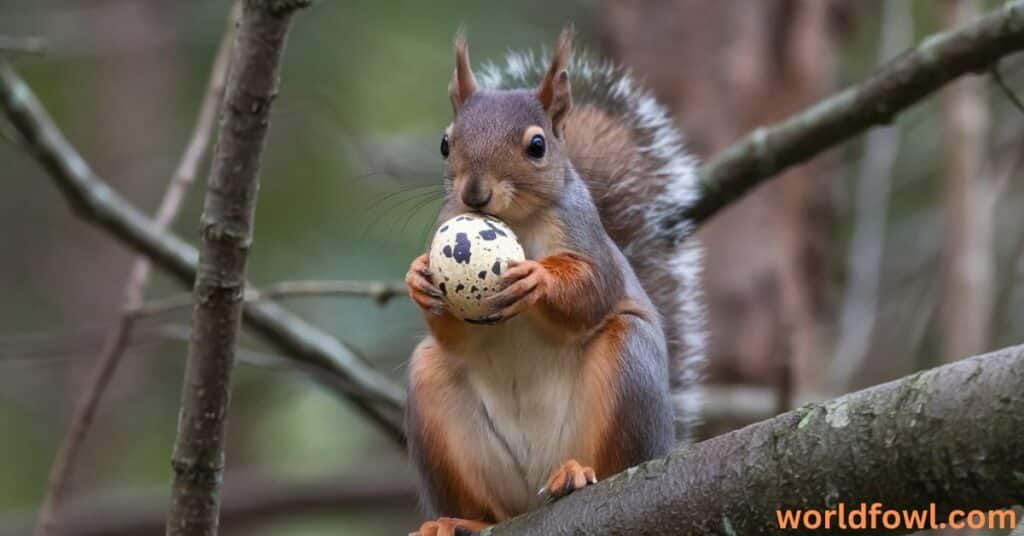
While squirrels are certainly capable of raiding bird nests for eggs, do squirrels eat bird eggs regularly? Let’s break this down.
Frequency of Occurrence
Squirrels don’t regularly rely on bird eggs as their primary food source. Instead, they prefer nuts, seeds, fruits, and other plant-based materials. However, during times of food scarcity, especially in the early spring, squirrels are more likely to turn to bird eggs as a quick and accessible food source. This makes egg predation more common during certain seasons, such as the spring nesting season.
Other Food Sources
Squirrels have a wide range of other food options available to them, so bird eggs aren’t necessarily their go-to choice. If nuts, fruits, or seeds are readily available, squirrels are less likely to target bird nests. However, when other sources depleted, squirrels often turn to bird eggs as a readily accessible, nutritious food source.
Observations and Case Studies
There have been several documented cases of squirrels eating bird eggs, particularly in urban areas where food options for squirrels are more varied. For instance, in a study on gray squirrels in urban parks, researchers note that squirrels raided birdhouses during the early spring when other food sources, such as acorns, had been consumed. This behavior was more prevalent in areas where squirrels had easy access to bird nests located in low-lying areas.
See Also : 13 Spiritual Meanings of a Peacock Crossing Your Path
Impact on Bird Populations
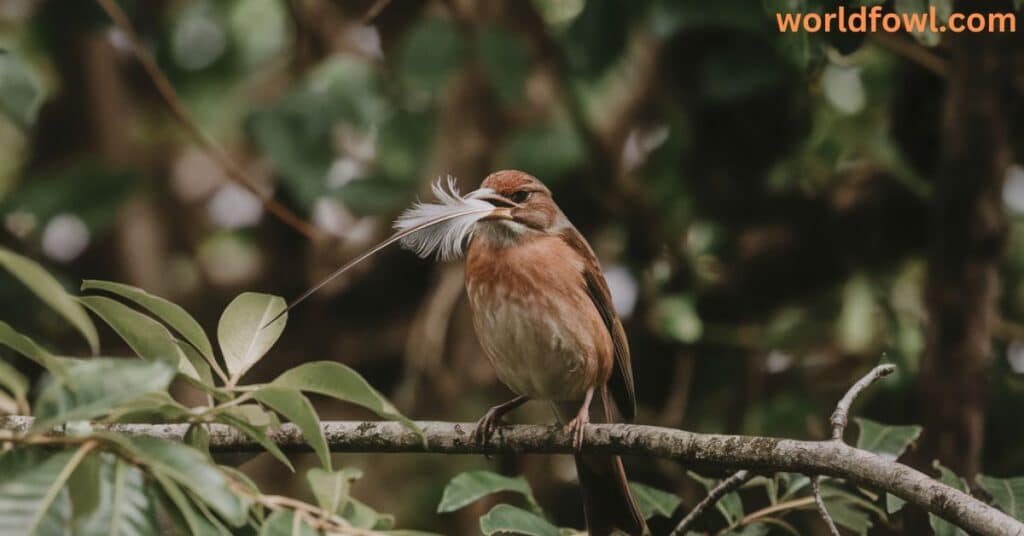
While squirrels may seem like a nuisance when they raid bird nests, their impact on local bird populations can be significant. Here’s a closer look at how squirrel predation affects bird species.
Effects on Nesting Birds
For birds that rely on bird eggs for reproduction, the loss of eggs due to squirrel predation can have a devastating impact. Bird nest safety is a top priority for many bird species, and egg predation can lead to the loss of an entire generation of birds. This is especially concerning for species that have limited reproductive cycles or are already facing other threats, such as habitat loss or climate change.
Predator-Prey Dynamics
In nature, every species plays a role in the food chain. While squirrels known to raid bird nests, they also preyed upon by larger predators such as hawks, owls, and foxes. The dynamics of squirrel egg predation and bird populations reflect the complex balance of the ecosystem.
However, when squirrel populations increase due to abundant food sources, such as in urban environments, the balance between predator and prey can shift, leading to more frequent raids on bird nests. This can contribute to a decline in local bird populations, especially if other predators are less common in the area.
See Also : Do Vultures Attack Humans? Here’s What You Need To Know
How to Protect Bird Eggs from Squirrels
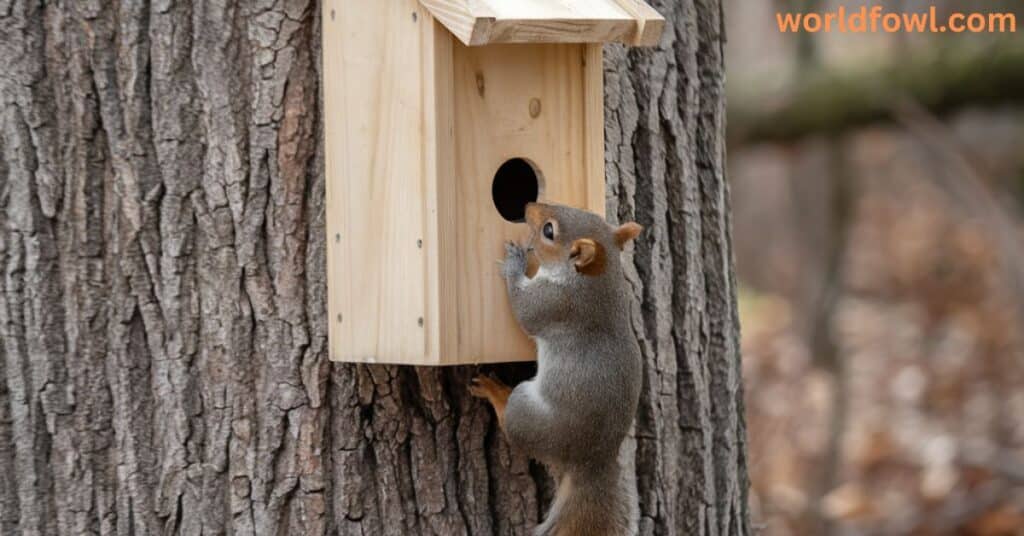
If you’re concerned about squirrels raiding bird nests in your backyard, there are several strategies you can implement to protect bird eggs from these clever rodents.
Physical Barriers
One of the best ways to prevent squirrels from eating bird eggs is to install predator guards on birdhouses. These guards placed around the entrance hole to prevent squirrels from gaining access. Additionally, squirrel-proof baffles attached to poles that hold birdhouses, making it harder for squirrels to climb and reach the nests.
Habitat Modification
To make your yard less inviting to squirrels, consider making habitat modifications. Tree pruning can help limit squirrels’ access to bird nests in high branches, while strategically placing birdhouses in areas that are harder for squirrels to reach can also reduce the likelihood of egg predation.
Feeding Practices
Squirrels often attract to bird feeders, which can bring them closer to birdhouses. To minimize this risk, squirrel-proof bird feeders are a good option. These feeders designed to make it difficult for squirrels to access the birdseed, ensuring they remain away from bird nests.
Conclusion: Do Squirrels Eat Bird Eggs?
In conclusion, squirrels do eat bird eggs, but this is not their primary food source. Squirrels are opportunistic feeders that will raid bird nests when other food options are scarce, especially during the spring and early summer. While squirrels’ behavior can be disruptive to bird populations, there are several measures you can take to protect bird eggs and minimize the risk of squirrel predation.
Understanding squirrel behavior and the impact of their actions on local wildlife is important for maintaining a balance in your yard or garden. With the right protective measures in place, you can help ensure the safety of the birds that visit your backyard while still allowing squirrels to enjoy the abundance of food your garden offers.

Henry James is a seasoned blogger and a passionate storyteller on “World Fowl.” With years of experience crafting engaging content, he brings a unique blend of expertise and creativity to his writing. Henry specializes in exploring diverse topics with depth and clarity, captivating readers worldwide.

